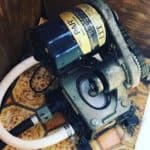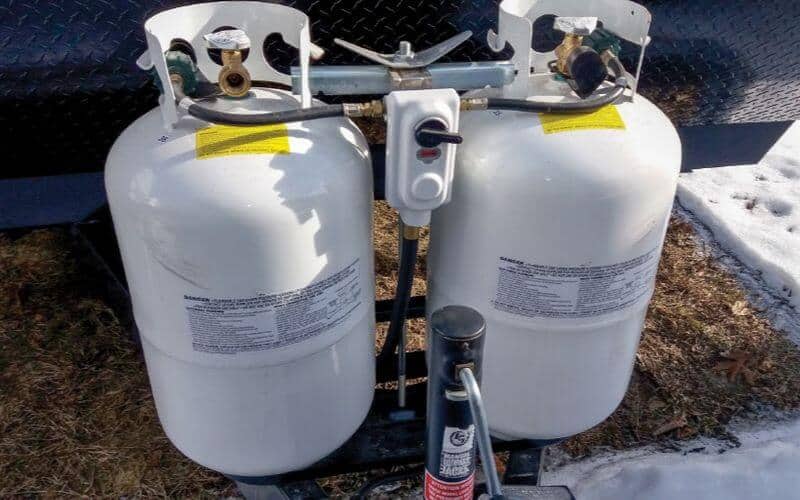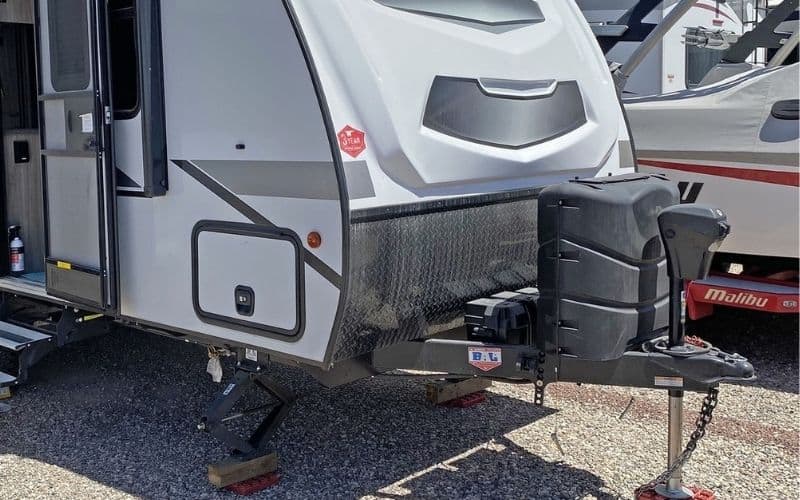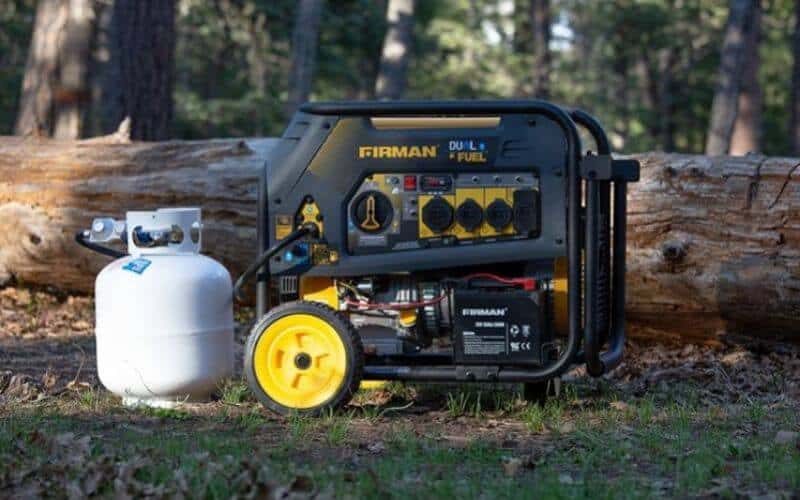Many modern-day RVs have built-in or after-market propane systems installed to run cooktop ranges, water heaters, and absorption refrigerators.
When you are away from home this system is fueled by special propane tanks. Also known as gas cylinders or gas bottles, these tanks are required by law to be certified for safe operation.
If your RV uses a 25-gallon tank, you can simply keep swapping it out at an affiliated retailer, who will then provide you with a full tank that has already passed certification requirements.
What if you have a larger gas cylinder or one that is more than 12-years old? Is it possible to get that propane tank recertified?
The answer is that yes you can get it recertified, so long as you use an accredited professional. The tank will have to pass certain criteria and even if it passes regulations, there will still be a fee. Some tanks might need to be repaired. A failed tank may need to be properly disposed of, which depending on where you go, could also incur additional costs.
In this article, we will take a closer look at the motorhome propane tank recertification process, how often do propane tanks need to be certified and where to do it near you.
As well as alternative topics like whether it would just be better to purchase a new tank.
We will also touch on possible ways to properly dispose of an older propane cylinder that failed to be recertified.
How Do You Tell If My Propane Tank Is Expired?
If you look around the collar near the primary valve you will see the original tank manufacturer date lightly stamped into the metal.
If you’ve been using recycled tanks or tanks that you swap out at a certified retailer, this area might have been repainted multiple times.
It’s a standard practice, which keeps their tanks looking nice and clean. It’s not an attempt to obscure the age of the tank.
However, a heavily repainted tank might be a sign that it’s old or has lived a tough life before they placed it in your hands. It wouldn’t hurt to take an extra second or two to give the collar area a good look.
The last thing you want is for an out of the way retailer to give you a tank that will expire in a month or two, which could potentially leave you on the hook for the recertification cost.
If your tank was previously recertified, there should be a propane tank recertification stamp on the upper portion of the tank that will be easy to read.
How Often Do You Have To Recertify Propane Tanks?
The United States takes a very serious stance when it comes to propane tank safety. The amount of energy stored in even a single one-pound propane cylinder can be a major safety concern. By law, all motorhome propane tanks need to be recertified every 12 years.
How Long Is Propane Tank Recertification Good For?
When a propane tank is fresh off the line it has 12 years until it needs to be inspected and recertified by a licensed professional.
If it passes the next recertification test you have only five more years until it needs to be inspected again.
The sticker on the top of a recertified tank is hard for a refill technician to miss. If your tank is past five years from its last certified inspection, you should expect it not to be filled.
Is There A Penalty For Not Recertifying A Propane Tank?
Unless there are some obscure local laws of the in place, there isn’t a specific fee or fine for using a tank that is more than 12 years old.
However, propane refill retailers are required by law to check the stamped-on date or to check for a recertification sticker.
There might be a handful of backwoods refill stations who don’t bother or the occasional apathetic employee who looks the other way when filling your tank.
In general, you should expect that if your propane tank has surpassed its recertification date, that you won’t be able to fill it.
It’s important to note that there are some propane tanks like the DOT 39, that are not meant to be refilled or recertified.
The United States Department of Transportation notes that these are one-time use propane tanks, and any attempt to refill them or alter them is a severe danger and comes with very stiff legal penalties.
Where To Get Propane Tanks Recertified Near Me?
A propane tank must be recertified by a certified propane retailer. Finding one is pretty easy and takes little more than searching with the term “Certified Propane Retailer Near Me.”
Depending on where you live, you should consider calling in advance. In some rural and remote areas, you might only be able to find a small operation with one properly trained individual who can carry out the test.
You should also inquire about the price. Some places have an equation they follow to the letter, while others will come up with their own fly-by-night pricing.
You are more likely to run into sketchy or otherwise inflated recertification fees in rural and backwoods areas.
How Is The Recertification Process Performed?
The certified technician uses special tools to check the tank for leaks. This will also include a pressure test of the main valve.
Most of the time if there’s a problem it will be with the valve, which can sometimes be replaced inexpensively.
Some states also have laws in place, which might require you to upgrade or replace the main valve as part of the recertification process.
If you are in another state on an RV vacation and you need to have a tank recertified, you might want to call around for price quotes.
Can Propane Go Bad In An Old Tank?
Propane is a stable hydrocarbon chain. So even if your tank is bad, or fails recertification, the gas inside isn’t going to break down or be dangerous.
However, some recertification failures are related to the safety of the tank itself. Even if your tank was previously providing sufficient gas to the system, you still shouldn’t use it after a failed recertification test.
There have been various news stories over the years noting individuals who lost their lives in catastrophic accidents caused by a seemingly minor propane tank leak.
Can I Test My Own Propane Tank?
By law only certified professionals can test or physically modify a propane tank. Attempting to manipulate your propane tank in any way can result in incredibly stiff penalties.
Even if you are particularly handy and have all the tools, it could still be incredibly dangerous to try to test, alter, or upgrade a propane tank valve yourself.
Is It Cheaper To Get My Propane Tank Re-Certified Rather Buying A New Propane Tank?
If your RV is currently set up to run off a 25-pound propane tank, then it’s much easier to simply trade it in at an affiliated retail exchange.
Once your old tank is in their system, they are legally responsible for making sure it meets all recertification requirements.
If you shop around you can find a recertification technician who can perform the test for less than $20.
If the valve fails the test and needs to be replaced ask for a price quote. You can then balance that against the cost of a new propane tank.
If you have a propane tank that’s over 12 years old or is designed to hold more than 25 pounds of liquid propane, then you might want to crunch some numbers.
In general, buying a new tank will cost you more than the fee for recertification. If you are running on a budget, you might be able to shop around to find a larger tank available at a discount store like Costco.
Most of the time, a reputable propane retailer offering recertification services will charge you less for a test and a value upgrade than the cost of buying a whole new tank.
When it comes to a “Well-Cared-For” propane tank that is around 16 or 17 years old and is up for its second recertification, as well as a likely valve upgrade, then the overall cost might be more than simply going out to buy a brand new tank. Especially, if a local discount retailer has one on sale.
How Do I Properly Dispose Of A Failed Or Damaged Propane Tank?
If your tank does happen to fail recertification, you will need to have it properly disposed of. Depending on where you go, there might be a fee for proper disposal of a defunct propane tank.
The way around this cost is to seek out a county hazardous waste facility who will take it either for free or for a very small fee.
There are also some cities who have disposal days where you can put just about anything out on the curb and they take it away, with no questions asked.
Most tanks this old end up needing to have the primary valve replaced one or more time. Which if you go to the right place, and shop around this might be very affordable.
If your tank fails the recertification test and you don’t want to pay a fee to have someone dispose of it, there are some options. You just have to be patient.
Some states have county disposal offices which specialize in hazardous materials, including out of date or damaged propane tanks. Depending on the state of the tank and the safety risk, they may charge a fee.
There are also some communities who have “Junk Days” in the spring or fall. You simply place something you want to be disposed on the curb, and the city comes to pick it up with no questions asked, and no fee applied.
When Is A Propane Tank Too Old?
When we do some basic math, the first recertification test needs to be done in the first 12 years. Then again, every five years.
That means it will be around 16 to 17 years old when you bring it in for the second recertification test.
From a technical standpoint, it is possible that the tank can still function properly, and pass recertification at 17 years old.
Especially if the tank has been well cared for and has been stored out of the elements when not in use. So, this does come down to a little bit of personal preference.







1 Comment
Steve
11 months agoAaron, Built-in propane tanks, like in a motorhome, have to be ASME tanks and do not require recertification after the initial manufacturing certification. They’re built with thicker steel and welds and are heavier than “swappable” DOT tanks like the ones you see on the front of a travel trailer or connected to a grill. Only the DOT tanks require recertification.